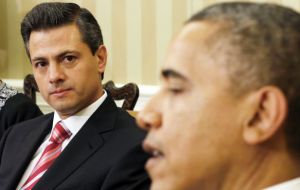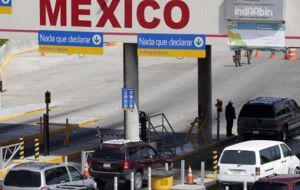MercoPress. South Atlantic News Agency
Obama begins fourth visit to strategic Mexico with a full agenda of critical issues
 In an unusual gesture to a foreign leader Obama received Peña Nieto in the Oval Office before he was even inaugurated
In an unusual gesture to a foreign leader Obama received Peña Nieto in the Oval Office before he was even inaugurated  Immigration, demographics, energy, trade (500bn annually), drugs are among the main issues to be considered
Immigration, demographics, energy, trade (500bn annually), drugs are among the main issues to be considered  Peña Nieto has managed to negotiate with the three main parties the ‘Pact for Mexico” with promised of much delayed reforms
Peña Nieto has managed to negotiate with the three main parties the ‘Pact for Mexico” with promised of much delayed reforms President Barack Obama leaves on Thursday for Mexico and Costa Rica, on a strategic mission to deepen trade ties and jobs’ creation but also hoping to discuss US immigration reform, security threats and drug wars.
The three-day trip will see Obama meet new Mexican President Enrique Peña Nieto, then hold his first summit with Central American leaders since the death of Washington's regional rival, Venezuela's Hugo Chavez, in March.
Twenty years into the North American Free Trade Agreement (NAFTA), also including Canada, Mexico is Washington's second-largest export market and its third ranked trade partner, so economics will top the agenda.
“A lot of the focus is going to be on economics,” Obama told reporters Tuesday. “We've spent so much time on security issues between the US and Mexico that sometimes I think we forget this is a massive trading partner responsible for huge amounts of commerce and huge numbers of jobs on both sides of the border.”
Trade between the United States and Mexico is worth 500 billion dollars, a year -- more than four times what it was before the debut of NAFTA.
“We want to see how we can deepen that,” said Obama, who offered an unusual gesture to a foreign leader when he meet Peña Nieto in the Oval Office last November, before he was even inaugurated.
As he did then, Obama is likely to strongly endorse Peña Nieto's vow to end the six-year reign of violence when the previous president Felipe Calderón sent the Army after the murderous drug cartels which are now blamed for a staggering 70,000 deaths and all type of abuses committed during the last six years.
Under the “Merida Initiative” signed by Obama's predecessor George W. Bush, the United States has sent 1.9 billion dollars in aid to Mexico, much of it in military equipment, as both nations fight the cartels.
But Peña Nieto's new government is stressing it is committed to a new approach, which seeks to drain the swamp of violence by providing economic development to hot regions in the drugs war.
“You don't fight violence with more violence” Mexican Interior Minister Miguel Angel Osorio Chong said during a visit to Washington last month. ”You can get a Mexico in peace (with a new strategy).”
Latest media reports indicate that the Army and the other forces have significantly decreased their military operations and deployments, and this trend is expected to continue, while the number of related deaths has diminished.
However there are suspicions (fears¿?) that the old Revolutionary Institutional Party, (PRI) that has controlled the country’s politics for almost a century expect for the last twelve years, could have reached some kind of understanding with the drug cartels on a cease-fire or something similar, and at what trading price.
As he launches his presidency, Peña Nieto wants to broaden the agenda with the United States, said Carl Meacham, director of the Americas program at the Center for Strategic and International Studies in Washington.
After several years of recession the country is going through what the US press calls the “Mexico moment” because of the package of long delayed reforms that have been agreed by the three main parties under the so called Pact for Mexico.
This not only refers to bilateral trade and job creation on both sides of the long border but reforms in the energy and fiscal sectors which allegedly are to be presented in the second half of the year and would help open Mexico’s oil industry, a government monopoly, to certain foreign investment participation, while at the same time improving tax collection and making sure all Mexicans, particularly the rich pay their dues.
In energy shale oil and gas could transform NAFTA members and make its three members strong net exporters in the next few years and at the same time increase reserves.
“They don't want to just be focusing on security, even though I think they will continue focusing on security -- and they still have a lot of problems regarding security.”
Obama will be making his fourth visit to Mexico since taking office in 2009 and his sixth to Latin America, as his administration seeks to harness the region's growing economic clout in an effort to boost sluggish US growth.
In Costa Rica, Obama will hold talks with the leaders of Latin American nations as the region digests the geopolitical consequences of late Venezuelan president Chavez's demise and the looming end of the Castro brothers’ era in the family ruled Cuba.
His host will be Costa Rican President Laura Chinchilla, the most unpopular leader in Latinamerica. However Costa Rica is a long standing reliable ally of Washington.
While Obama will be venturing abroad, he will also have a domestic mission to accomplish on his trip -- which comes at a critical time for a bipartisan Senate push for comprehensive immigration reform.
The project, to bring 11 million illegal immigrants out of the shadows, would make a handsome addition to Obama's political legacy.
Its chances of passing the normally gridlocked Congress are enhanced by the fact that it is a key issue for Hispanics, a critical voting demographic Republicans know they must court to win national elections.
Furthermore Obama arrives in Mexico when his public opinion standing in the country is at its highest, as well as confidence that he will manage the immigration issue. This is contrary to the US where public opinion regarding Mexico and the drugs’ war is at its lowest and there is a feeling of enough is enough.




Top Comments
Disclaimer & comment rulesCommenting for this story is now closed.
If you have a Facebook account, become a fan and comment on our Facebook Page!